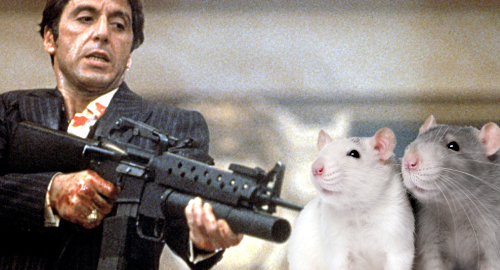 South Korean researchers hope their experiments with administering cocaine to rats will help lead to more effective treatments for problem gamblers.
South Korean researchers hope their experiments with administering cocaine to rats will help lead to more effective treatments for problem gamblers.
A new study by researchers at Seoul’s Yonsei Medical University have come to the not-at-all-utterly-predictable-well-in-advance conclusion that using cocaine aggravates poor decision-making.
The researchers wanted more insight into how the interaction of trait and environmental factors affected risk preference in animals, in this case, everyone’s favorite gambling guinea pigs, rats. The study involved introducing rats to a touch-screen chamber featuring four different light signals that produced different reward and punishment outcomes.
Once the rats had been categorized as either risk-averse or risk-seeking, the scientists injected some of them with cocaine, then re-tested their reactions while “cocaine-challenged.” (I considered myself cocaine-challenged once, after my entrepreneurial friend Eric got busted, but I suspect that’s not how the researchers define the term.)
Anyway, after studying the coked-up rats, the researchers concluded that cocaine use “may become a trigger that aggravates choice preference towards more risk-seeking behavior.” Frankly, we think the researchers could have reached the same conclusions just by watching the last half-hour of Scarface, but so far we’ve been unable to find anyone willing to give us a major financial grant for just firing up Netflix.
OPTOGENETICS TURNS LOSERS INTO WINNERS
An entirely different study of mice by researchers at the Chinese Academy of Sciences in Shanghai offers hope that problem gambling behavior could one day be corrected by bombarding gamblers’ brains with optogenetic lights.
The Chinese researchers first measured ‘mouse dominance’ by feeding two mice into opposite ends of a tube in which there wasn’t room for both mice to pass. The mice that forced their rivals to back out of the tube were dubbed ‘winner’ mice, while the others were (surprise!) labeled as losers.
The researchers emphasized that the winners weren’t necessarily bigger or stronger, just “more persistently aggressive” in getting what they wanted. The winners also showed more activity in the area of the brain that controls “effortful behavior” and “social dominance.”
The researchers then stimulated the brains of loser mice with their optogenetic tools, and the losers immediately began pushing around the so-called winners. As one researcher told the Guardian, the former losers didn’t necessarily become more aggressive, but showed increased “perseverance, motivational drive, grit.”
What’s more, some of the former losers didn’t revert to their losing ways once the researchers stopped applying the optogenetic stimulation. Could such treatments someday be applied to the brains of problem gamblers to provide them with the willpower to permanently curb their destructive behavior? Perhaps. In the meantime, where do we volunteer for the human trials of the cocaine-challenged rat casino?





